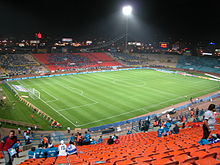Maccabiah Games

The Maccabiah Games (Hebrew: מַכַּבִּיָּה) is an international Jewish athletic event similar to the Olympics. The Maccabiah is held in Israel every four years under the auspices of the Maccabi Federation, a part of the Maccabi World Union. [1]. Although primarily for Jewish athletes, Arab Israelis can also participate.[1] It is sanctioned by the International Olympic Committee and World Federation of Sports.[2] The Maccabiah Games is one of the five largest sporting events in the world by participation[3] and is considered a Regional Games by the International Olympic Committee.[4]
Since 1932, the Games have been held roughly every four years. The third Maccabiah Games, scheduled for 1938, was delayed until 1950 due to the rise of Nazism in Europe and the outbreak of the Second World War. The Maccabiah Games have been a quadrennial event since 1957.
Ironically, Judas Maccabeus, the man for whom the games are named, strongly disapproved of athletic games and competitions, which were a clear influence of Greek culture and were introduced into Jerusalem by his staunch enemies the Hellenising Jews, and abolished upon his getting control of the city. These games are modelled on the modern Olympics - in turn modeled on the Classical Greek ones, of which Maccabeus also evidently disapproved as part of an alien and hostile culture.
History

Originally conceived by Yosef Yekutieli, a 15-year-old inspired by the 1912 Stockholm Olympic Games,[5] the Games were first held in 1932 after 14 years of development by Yekutieli and the Jewish National Fund. During the planning stages, the games were nicknamed the Maccabiyon and 1932 was selected as the year to host the first game marking the 1,800 anniversary to the Bar Kochba revolt.[6]
To generate interest in the games, and collect donations with which to build a stadium in Tel Aviv (Ha'Maccabiah Stadium), a group of representatives traveled by motorcycle on two separate routes, promoting the games to different communities. The first was from Palestine to Syria, Turkey, Poland, Germany, France, and Belgium. The second from May 10 through July 16, 1931, went from Tel Aviv through the Sinai desert to Cairo and Alexandria in Egypt, and then proceeded by ship to Salonika in Greece, Bulgaria, Yugoslavia, Czechoslovakia, Austria, Germany, and France, and by ferry to Brighton and the English cities of London, Birmingham, Manchester, and Leeds to Glasgow in Scotland, and home via Beirut in Lebanon.[7]
The Games were opened on March,28 1932 and about 400 sportsmen took part. The Games were held in athletics, football and swimming.
The 2nd Maccabiah Games was held in 1935.
17th Maccabiah Games
The 2005 Maccabiah Games attracted the largest attendance of any Maccabiah Games to date. This included more than 900 representatives from the United States, almost 500 from Australia, and more than 2,000 from Israel, bringing the total participants to more than 7,700.
Israel finished at the top of the medal count with 227 gold medals. The United States was a distant second with 71 gold medals, while Russia came in third with 15.
Structure
The games, always held in Israel, are in fact three separate competitions -- 'Open,' 'Juniors,' and 'Masters.' Every Israeli citizen (Jewish or non-Jewish), and every Jewish person not an Israeli citizen, is eligible to compete in the Games. Sports in the Junior games are open to any qualifying athlete aged 15 to 18. Masters' sports are divided into a number of different age categories -- generally for older competitors.
Unlike the Olympic games and other major international sporting events, the sport list for the Maccabiah Games is not set in stone. The "Basic Rules" of the Maccabiah Games state that competitions will only take place if four (three, in the case of all female sports, and Junior team sports) countries bring competitors for that sport.[2]
Notable participants
Among the Olympic gold medalists, world champions, and world record holders who have competed in the Maccabiah Games are Mark Spitz, Lenny Krayzelburg, and Marilyn Ramenofsky (swimming); Debbie Lipman (diving); Mitch Gaylord, Abie Grossfeld, and Agnes Keleti (gymnastics); Larry Brown, Ernie Grunfeld, Danny Schayes, (coaches) Nat Holman and Dolph Schayes (basketball); Carina Benninga (field hockey); Lillian Copeland, Gerald Ashworth, and Gary Gubner (track and field); Angela Buxton, Brad Gilbert, Julie Heldman, Allen Fox, Nicolás Massú, and Dick Savitt (tennis); Angelica Rozeanu (table tennis); Sergei Charikov and Vadim Gutzeit (fencing); Isaac Berger and Frank Spellman (weightlifting); and Fred Oberlander and Henry Wittenberg (wrestling); and Adam Bacher (cricket).[3]
Spinoff games
World Maccabi bodies
- U.S. Maccabi
- Canada Maccabi
- Maccabi Hungary
- Maccabi Australia
- Maccabi Italia
- Maccabi GB
- Makkabi Germany
Many Jewish schools from all over the world send students who are particularly talented in a sport to Israel to participate in the games.
Footnotes
- ^ The Maccabi movement, started in 1895 and named after Judah Maccabee, is an international Jewish sports, cultural, social, and educational organization,
- ^ 17th Maccabiah Basic Regulations
- ^ The Maccabiah Games

